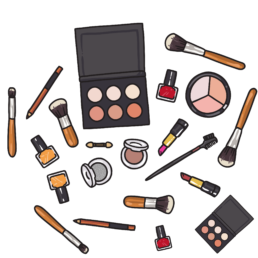Types of Beauty Businesses You Can Establish
Whether you want to start a beauty business online or offline, with GovDocFiling, you can do it all. However, as a beauty business owner, you need to figure out which sort of business you’d like to start.
Here are some beauty business ideas:
Beauty Service Businesses:
- Hair Stylist
- Nail Salon
- Estheticians
- Makeup Artist
- Beauty Salon
Beauty Product Businesses:
- Beauty Raw Material Manufacturing Business
- Beauty Products Manufacturing Business
- Beauty Products Dropshipping Business
- Wholesale and Warehousing
- Beauty Products White-Labeling
- Beauty Products Subscription Business
- Cosmetics Supply Store
- Ecommerce Store for Beauty Products
Regardless of the type of beauty business you choose to start, legally registering your business is a must. This can get challenging especially if you’re a solopreneur. You can now do it with ease though.
Starting a beauty business has never been easier!
Starting a Beauty Business: Things You Need
Starting a beauty business is a monumental task. You have to plan your business structure, figure out financing, find employees, and so much more. All of this requires a lot of time investment.
Here’s everything that you need to have in place to start a beauty business from the beginning and grow it:
Identify Your Specific Beauty Niche to Target
One of the most important things that you need to do to start a beauty LLC business is to find your niche.
Here’s the best way to identify your beauty niche. All you have to do is answer these questions:
- Do you intend to offer your services online, in person, or through both channels?
- Are you going to be a wholesaler or retailer?
- Which services are you going to offer?
- Will you establish a physical store or provide services at homes?
- Do you intend to be the sole service provider or will you have a team?
- Do you plan to manufacture the product yourself or source it from other companies?
- Do you intend to do white-labeling?
The overlapping answer to these questions will give you the perfect beauty business niche for your new business.


Conduct Market Research for Your Beauty Business
To start a beauty business, you need to find out if your business idea will have any takers and who your competitors are.
Conduct market research to get answers to questions like:
- Is there any demand for your beauty products or services?
- How big is the market?
- How many other local businesses offer the same services as you?
- Are there sufficient places to source products that are essential for your services?
- Do you have the capacity to meet the demand?
- What can you offer that other local businesses don’t offer already?
- Who forms your target audience?
- Can your potential customers buy your services locally or online?
- What is the profit margin?
Conducting this market research will help you understand if your business idea is feasible and if you should consider investing your time and money into it.
Find or Make Beauty Products or Services to Sell
Based on your beauty business type, you’ll either have to find or develop products or services that your customers will want to buy.
You can:
- Discover products that can solve customers’ problems.
- Look for products you can white label.
- Discover products or services that are trending.
- Research and visit salons in your local area.
- Make sure you have the right credentials and beauty certifications.


Develop a Marketing Plan for Your Beauty Business
To start a beauty business, you need a well-laid-out marketing plan. Without it, you may find it difficult to ascertain where you need to put your money to generate the most sales. Whether it’s digital or traditional marketing, here’s what you should do:
- Choose your business name, font style, brand persona, logo, and colors.
- Finding a shop in a high footfall area.
- Select the digital and traditional channels you’ll use for marketing.
- Choose the third-party apps on which you’ll list your business.
- Design a website and set up business email addresses.
- List your business on Google My Business (GMB).
- Take photos of the products or services offered.
- Come up with stellar product or service descriptions.
- Define the budget you’ll allocate to various marketing channels.
- Incorporate a payment processing functionality into your online store.
Decide on a Legal Structure for Your Beauty Business
The final thing that you need before starting a beauty business is to decide on its legal structure. Each legal structure has its own pros and cons and you need to understand each of these before proceeding with one.
Here are the most well-known legal business structures:
Among these, an LLC or a limited liability company is often the most common and best choice for first time business owners or small businesses. It gives you a lot of control over your company and also offers the best features of both partnerships and corporations. Importantly, it protects you from personal liability.
Yet, there are legal requirements for starting and maintaining an LLC. That’s where we come in. GovDocFiling can simplify the filing process for LLCs and also handle all the paperwork so that you can set up your beauty business LLC with minimal effort.
Quick and easy LLC set up.

How to Start a Beauty LLC Business in 8 Easy Steps
LLCs are easy to manage but can be even simpler to start when you use our services.
Here’s the complete guide to starting a small business:
Step 1
Fix Your Business Niche
To start a beauty business, you need to figure out what you’re planning to sell and who your customers are. You can choose from niches like hairstyling salon, beauty salon, makeup services, beauty raw materials, ecommerce stores, beauty product warehousing, beauty products white-labeling, etc. to get started.
Step 2
Decide on the Beauty Products or Services
Based on the niche and audience, you’ll also have to decide on the products or services that you intend to sell to your customers. You’ll also need to decide if you’ll procure them from others or produce them yourself. Additionally, you need to figure out if you’ll be the sole one offering the services or have a team, and how and where you want to provide your beauty service (salon or on the road?).
Step 3
Choose a Business Name
The next step in starting a beauty brand is that of coming up with a name for it. Your name needs to be catchy and marketable. The idea is to make it easy for people to remember it so that they keep returning to you for your products and services. It should be such that they stop by your shop when they’re going down the street. Additionally, it must be unique so that it sets you apart from other beauty brands.
Step 4
Find a Space to Operate
One of the most important things about setting up a beauty business is that of finding a space to operate, and there are a few different options for providing services too. You can start your own salon or store, rent space at an already existing salon, visit your clients at their homes, or specialize in doing beauty for events. Depending on this decision, there will be varying levels of next steps for your business requirements and operations.
Step 5
Understand the Advantages of an LLC Business Structure
One of the biggest advantages of picking an LLC over other forms of business structures is that it’s easy to form and flexible too. At the same time, your company is treated as a separate entity, which protects you from any liabilities that arise.
Also, the paperwork and compliance requirements are minimal for LLCs. You also get flexibility with the management and pass-through taxation advantages with them.
Step 6
Get the State and Federal Filings Done with GovDocFiling
Regardless of the type of business structure you choose, you’ll have to complete state and federal filings to legally start your beauty business. In the case of LLCs, you’ll need to:
- File Articles of Organization in your state
- Get a Federal Tax ID (EIN)
- Create an LLC Operating Agreement
With GovDocFiling, this entire process becomes easier as we’ll expedite all of your legal paperwork and all you have to do is fill out one simple online application form.
Step 7
Open a Bank Account for Your Beauty Business
To keep your personal finances separate from the ones of your business, you should set up a business bank account. To create one, you’ll need to submit your tax ID and business formation documents.
Step 8
Look for Vendors, Suppliers, and Shippers
After formally starting a beauty business, you need to set up your supply chain. For this, you need to find vendors, suppliers, and shippers.
To start, you need to figure out exactly what products or supplies you’ll need. Then, you’ll need to look for brands that offer those supplies. To find the brands, you can:
- Conduct online searches
- Look at competitors’ suppliers
- Get referrals from others in your industry
- Check B2B vendor portals
Make sure you fix a budget for your products and then start narrowing down the list of the brands. Consider both local and overseas manufacturers to ensure that you get the best ones possible.
You should also audit the suppliers to figure out if their products are up to the mark. After going through this process, you’ll be left with a few reliable ones. Next, request a quote from them and negotiate the terms of your contract before finally signing it.
Apart from these, you may also need to find other third-parties like marketing agencies.
Step 9
Market Your Beauty Business
Whether it’s setting up your website, building a powerful presence on social media platforms, or leveraging content marketing and SEO, you need to execute your marketing strategy effectively.
This can help you reach your target audience with ease and help you get customers. For beauty service businesses, networking is very important. Network with local businesses and individuals in similar industries and try to build up your client book with referrals. Also, create profiles on local business service websites like Yelp, Facebook, and Instagram to show off your services. Beauty is very visual, so show off your work with photos too!
That’s all! Now that you’ve understood what goes into starting a beauty business, let’s go ahead and get your business set up.
While getting started, you should invest all your time and effort into planning your business and marketing it. Leave the legal processes to us and we’ll get them done with finesse.
The only application you’ll need to fill out.
Why Choose GovDocFiling to Start a Beauty LLC Business?
We understand exactly what goes into starting a beauty LLC business and can help you with all of the legal processes involved.
Our processes are simplified to save you time and effort and you’ll only have to pay for those services that your business actually needs.
With GovDocFiling, you get several advantages like:
Register and launch your beauty brand with GovDocFiling now.
Easy filing. No hidden costs.
6+
Years Of Experience
10,000+
Businesses Formed
100%
Satisfaction Guaranteed
Frequently Asked Questions
What is an example of a tax ID number?
A federal Tax ID Number is an identification number used by the Internal Revenue Service (IRS) to administer tax laws. This number is issued either by the IRS or Social Security Administration (SSA). A business Tax ID number is required on tax return forms.
Learn MoreHow do I get an EIN application?
An Employer Identification Number is a nine-digit number that identifies your business. It works much the same way your social security number does. If your company has employees, is a corporation or partnership, has a Keogh Plan or fits one of several other situations, it must have its own EIN.
Learn MoreHow many EIN numbers can I have?
As a business owner, you probably know your company needs an EIN (or Tax ID Number) issued by the IRS for tax purposes. But what if you own multiple businesses or operate different divisions of the same entity?
Learn MoreWhat is the purpose of a tax ID number?
Your business is going to need to file income taxes. The Internal Revenue Service uses Tax Identification Numbers to distinguish between individuals, business, and nonprofit organizations, but business tax ID numbers should be distinct from your personal federal tax ID number.
Learn MoreWhat does it mean to have a tax ID number?
For the IRS to conduct its business, it must have an easy way to identify each individual and business. To do this, they require each individual and business to have a tax ID number.
Learn MoreHow does an SSN differ from a tax ID?
A social security number (SSN) is a tax code used by an individual, while a tax ID is a nine-digit tax code for a business entity. For a business entity, a tax ID is usually called an EIN.
Learn MoreWhat is a DBA?
If you’ve ever considered working for yourself, or starting your own business, you may have wondered: what is a DBA? Is a fictitious business name the same as a DBA? What are the benefits of a DBA to my business and myself?
Learn MoreCan a DBA be filed for all business types?
Each type of business entity has clear advantages and disadvantages. Can a DBA be filed for all business types? In most cases, yes; but understanding what a DBA is and what it’s limitations are will help you decide if it’s worth
Learn MoreHow many DBA names can I register?
DBA application filing is a process overseen by state DBA laws and local government, protecting the public from nefarious business owners. DBA is an abbreviation for “doing business as,” and is also referred to as a fictitious name or trade name.
Learn MoreDo I need a DBA?
If you’ve ever considered freelancing, or starting your own business, you should take a few moments to answer this very important question: Do I need a DBA? Not every small business owner needs to pursue DBA application filing, but
Learn MoreAre any words prohibited in a DBA name?
DBA is an acronym that stands for “doing business as.” You may be wondering “do I need a DBA?” If you intend to do business using a name other than your legal business name, you need a DBA. DBAs are common for sole proprietors or partnerships that do not want to use the owners’ legal names to do business.
Learn MoreDBA vs. EIN
If you’re starting a business, there are more then a few abbreviations you’ll need to remember. Filing a DBA application, or applying for an EIN, are two common steps for new business owners. However, they are not the same thing, and as a business owner you should know the difference.
Learn MoreWhat is an LLC?
A limited liability company, commonly referred to as an LLC, combines the taxation benefits of a partnership with the limited liability of a corporation. Instead of partners, LLC business owners are called members, and there can be several, or a single member.
Learn MoreWhat are the benefits to filing for an EIN as an LLC?
A limited liability corporation is one in which the members aren’t personally responsible for any company liabilities or debt. Limited liabilities have the protections of a corporation but the flexibility of a partnership. If your business is listed as a limited liability corporation, you can benefit further by applying for an Employer Identification Number.
Learn MoreWhat’s the difference between an LLC and a corporation?
The fine print that separates a limited liability company (LLC) from a corporation can be overwhelming for new business owners or entrepreneurs. While the minutia of these details might be best suited for a legal advisor or accountant, the broad differences are fairly easy to understand, and they might be enough to help you make a judgment
Learn MoreWhat happens if I apply for the wrong LLC?
Limited Liability Companies (LLC) are popular business structures because they offer personal liability protection for members and don’t have all the formalities that corporations do. LLCs also enjoy pass-through taxation, which means the company doesn’t pay federal income taxes; instead,
Learn MoreWhat legal documents do I need to start an LLC?
For entrepreneurs thinking about starting their own business, forming an LLC is an ideal option, as such an entity provides the owners protection from lawsuits, business debts and other business indiscretions. However, in order to obtain that protection, there are a number of documents that the business owner or owners must file with the state government prior to conducting business.
Learn MoreWhat are the differences between a partnership and a Limited Liability Company?
A Limited Liability Company is a legal entity all its own, while a partnership is owned by two or more people who share legal responsibility of the business entity. In a partnership, the business does not possess a legal identity outside of the business owners. A Limited Liability Company offers more flexibility in terms of operations and personal asset protection.
Learn MoreWhat is a C-Corporation?
A C-Corporation is just anther way of saying corporation. It means the same thing. Corporations are incorporated business entities that file Articles of Incorporation with the Secretary of State or a similar government agency.
Learn MoreCan a C-Corp have multiple owners?
There are certain C-Corp requirements to meet whether you want to start a corporation with one shareholder or dozens. It is certainly possible to apply for a C-Corporation EIN with multiple owners, and when forming a C-Corp in this manner, there are a few points to keep in mind.
Learn MoreWhy is a C-Corp taxed differently than an LLC or S-Corp?
Unlike other business structures, C-Corp taxation is significant in that corporations are taxable entities. Corporations are taxed like an individual and contribute according to corporate income, and then again on shareholder tax returns. This is commonly called ‘double taxation’.
Learn MoreWhat is an S-Corp?
S-Corporations, sometimes called S-Corps, can be useful ways for business owners to avoid what’s called “double taxation”, while also protecting shareholder assets from personal liability. It’s a mix of advantages drawn from other types of business entities; and it isn’t nearly as complicated or time consuming as you might think to establish.
Learn MoreHow do I file to become an S-Corporation?
Before we dive into how to file to become an S-corporation, let’s take a look at what an S-corporation is, exactly, and why you may want to establish this type of business entity for your company. S-corporations are similar to partnerships, or sole proprietorships, at least in terms of how the company will affect you financially.
Learn MoreWhat is a disqualified S-Corporation?
There’s No Such Thing as a Disqualified S Corporation. Luckily, S corporation disqualification is more of an urban legend than fact. In 2010, Congress attempted to pass a measure that would have disqualified some S corporations, primarily small businesses, from using S corp tax structures when filing.
Learn MoreStarting a Beauty LLC Business? Get it Done the Right Way
GovDocFiling has years of experience helping businesses start from scratch.
Let us take care of all the legal matters of starting your beauty business so that you can concentrate on the one thing that matters most — your business.
Quick business formation. 24/7 support. Simple application
Choose Your Business Entity Type to Get Started
Launch your dream business with hassle-free online filing services by GovDocFiling in no time.
Select an Entity Type
Get started with our fast Tax ID/EIN application process. Select an entity and fill out the required fields
Explore the Entity Types
Click on the links below to learn more about the taxation rules and benefits of each entity type.
